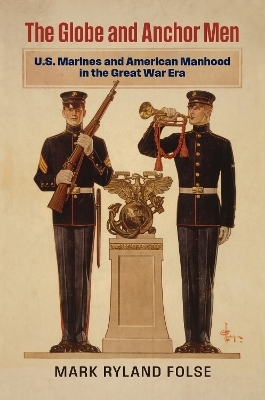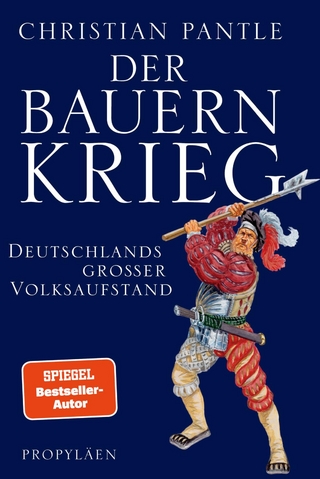
The Globe and Anchor Men
U.S. Marines and American Manhood in the Great War Era
Seiten
2024
University Press of Kansas (Verlag)
978-0-7006-3625-9 (ISBN)
University Press of Kansas (Verlag)
978-0-7006-3625-9 (ISBN)
- Lieferbar (Termin unbekannt)
- Versandkostenfrei innerhalb Deutschlands
- Auch auf Rechnung
- Verfügbarkeit in der Filiale vor Ort prüfen
- Artikel merken
Offers the first in-depth history of masculinity in the Marine Corps during the World War I era. White manhood and manliness constituted the lens through which the Marines of this period saw themselves, how they wanted the public to see them, and what they believed they contributed to society.
Throughout the World War I era, the United States Marine Corps’ efforts to promote their culture of manliness directed attention away from the dangers of war and military life and towards its potential benefits. As a military institution that valued physical, mental, and moral strength, the Marines created an alluring image for young men seeking a rite of passage into manhood. Within this context, the potential for danger and death only enhanced the appeal.Mark Ryland Folse’s The Globe and Anchor Men offers the first in-depth history of masculinity in the Marine Corps during the World War I era. White manhood and manliness constituted the lens through which the Marines of this period saw themselves, how they wanted the public to see them, and what they believed they contributed to society. Their highly gendered culture helped foster positive public relations, allowing Marines to successfully promote the potential benefits of becoming a Marine over the costs, even in times of war.
By examining how the Marine Corps’ culture, public image, and esteem within U.S. society evolved, Folse demonstrates that the American people measured the Marines’ usefulness not only in terms of military readiness but also according to standards of manliness set by popular culture and by Marines themselves. The Marines claimed to recruit the finest specimens of American manhood and make them even better: strong, brave, and morally upright. They claimed the Marine would be a man with a wealth of travel and experience behind him. He would be a proud and worthy citizen who had earned respect through his years of service, training, and struggle in the Marine Corps. Becoming a Marine benefited the man, and the new Marine benefited the nation. As men became manlier, the country did, too.
Throughout the World War I era, the United States Marine Corps’ efforts to promote their culture of manliness directed attention away from the dangers of war and military life and towards its potential benefits. As a military institution that valued physical, mental, and moral strength, the Marines created an alluring image for young men seeking a rite of passage into manhood. Within this context, the potential for danger and death only enhanced the appeal.Mark Ryland Folse’s The Globe and Anchor Men offers the first in-depth history of masculinity in the Marine Corps during the World War I era. White manhood and manliness constituted the lens through which the Marines of this period saw themselves, how they wanted the public to see them, and what they believed they contributed to society. Their highly gendered culture helped foster positive public relations, allowing Marines to successfully promote the potential benefits of becoming a Marine over the costs, even in times of war.
By examining how the Marine Corps’ culture, public image, and esteem within U.S. society evolved, Folse demonstrates that the American people measured the Marines’ usefulness not only in terms of military readiness but also according to standards of manliness set by popular culture and by Marines themselves. The Marines claimed to recruit the finest specimens of American manhood and make them even better: strong, brave, and morally upright. They claimed the Marine would be a man with a wealth of travel and experience behind him. He would be a proud and worthy citizen who had earned respect through his years of service, training, and struggle in the Marine Corps. Becoming a Marine benefited the man, and the new Marine benefited the nation. As men became manlier, the country did, too.
Mark Ryland Folse is a historian at the U.S. Army Center of Military History in Washington, DC, and the author of Operation Enduring Freedom: The United States Army in Afghanistan, September 2001–March 2002.
List of Figures
Preface
Introduction
Part I: Marine Corps Identity
1. Elements of the U.S. Marine Corps
2. With Hart Two-Fisted Hands
Part II: The Great War
3. A “Sure-’Nough” Man
4. the Cleanest and Strongest of Our Young Manhood
Part III. Consequences of War and Counterinsurgency
5. Tropicalitis
6. An Invitation to Brave Men
7. To Build Up a Class of Men
8. the Marine Corps “Trys to Make Men”
Conclusion
Notes
Bibliography
Index
| Erscheinungsdatum | 17.02.2024 |
|---|---|
| Reihe/Serie | Modern War Studies |
| Zusatzinfo | 53 b&w photos |
| Verlagsort | Kansas |
| Sprache | englisch |
| Maße | 152 x 229 mm |
| Gewicht | 272 g |
| Themenwelt | Geschichte ► Teilgebiete der Geschichte ► Militärgeschichte |
| Sozialwissenschaften ► Politik / Verwaltung | |
| Sozialwissenschaften ► Soziologie ► Gender Studies | |
| ISBN-10 | 0-7006-3625-0 / 0700636250 |
| ISBN-13 | 978-0-7006-3625-9 / 9780700636259 |
| Zustand | Neuware |
| Informationen gemäß Produktsicherheitsverordnung (GPSR) | |
| Haben Sie eine Frage zum Produkt? |
Mehr entdecken
aus dem Bereich
aus dem Bereich
neueste Manipulationstechniken als Waffengattung der NATO
Buch | Softcover (2023)
Westend (Verlag)
24,00 €


